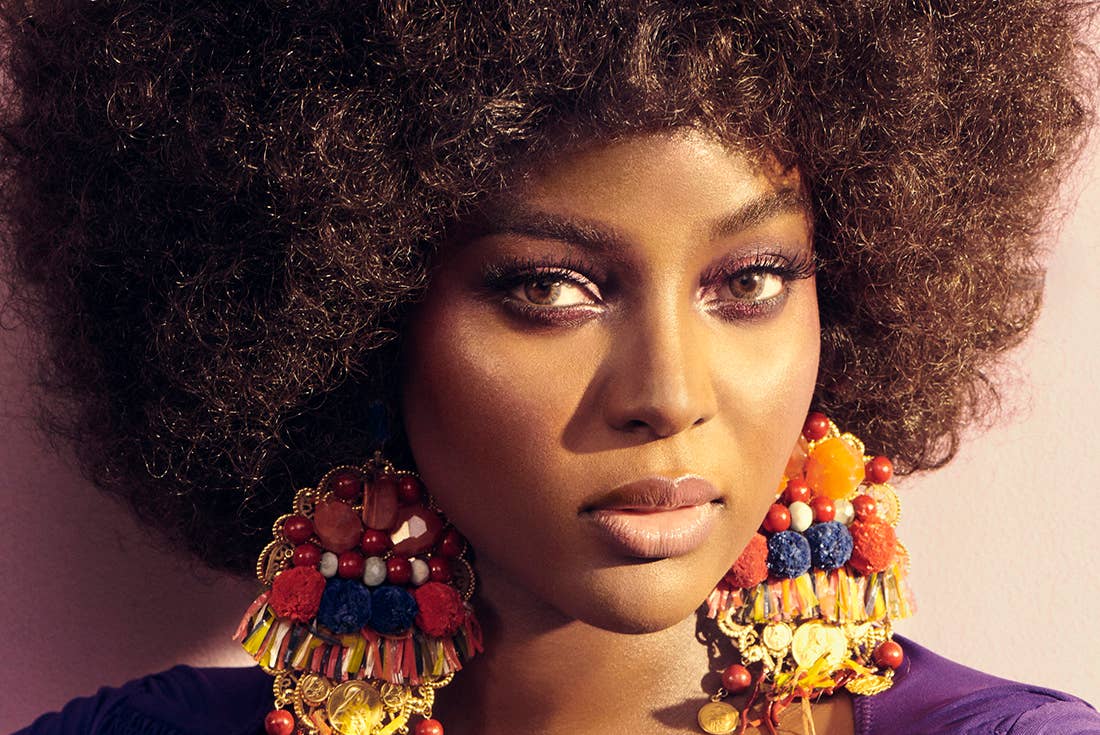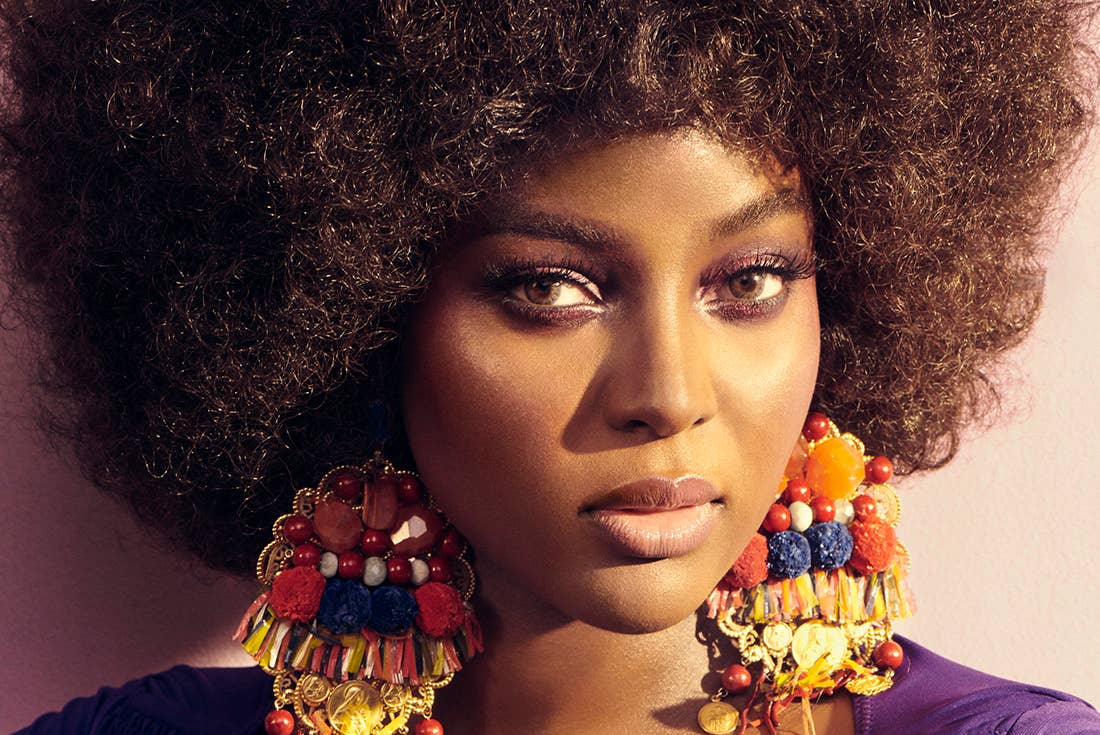
The often twisted court of public opinion has had a great deal to say about singer-songwriter Amara La Negra. While the verdict may still be out on the Love & Hip Hop: Miami star as a musician, her case as a household name has turned out to be one of the most telling cultural curiosities of 2018.
An unfortunate fact of fame is that once a certain point of visibility has been reached, artists who challenge the norms of eurocentricity are eventually tasked with either suppressing their blackness or being made to answer for it. La Negra has experienced both, as she navigates color lines in two separate parts of the diaspora—both Latin and Black America.
Embodying the intersection where those worlds meet, the Afro-Latina songstress lives in duality. Born in Miami to a migrant mother of the Dominican Republic, La Negra first gained celebrity as a Spanish-language recording artist in the Latin American market. All too familiar with the anti-black politics that exist in such circles, the dark skinned, full figured, kinky haired singer never mistook stardom for an escape from colorism.
"We need to desperately change the narrative. Not all of us are Jennifer Lopez, Sofia Vergara and Thalia.”
“At the end of the day, I’m not going to call myself something I’m not,” the singer tells Complex over the phone. “I carry my name La Negra very proudly. It’s a little bit rebellious because it’s my way of reclaiming myself. I’m very proud of the skin I’m in, and of my people and culture.”
An explicit example of the role anti-blackness has played in La Negra’s journey took place two years before VH1 catapulted her career. In 2016, non-Black Dominican beauty queen Geisha Montes de Oca brazenly mocked La Negra in blackface on the variety show Aquí Se Habla Español. The incident exists within the context of the Dominican Republic’s long, violent history of blackface; one that mirrors America’s own affinity for Jim Crow era minstrelsy.
In a way, La Negra’s variety show run-in with de Oca foreshadowed the reality show drama that introduced her to African-American viewers at the top of 2018. On Love & Hip Hop: Miami (returning on a new night Wednesday, Jan. 2 8/7c), Young Hollywood, a light skinned Latino producer, criticized La Negra for styling her hair in an afro, and eventually questioned her authenticity as an Afro-Latina in a scene that’s now infamous on social media.
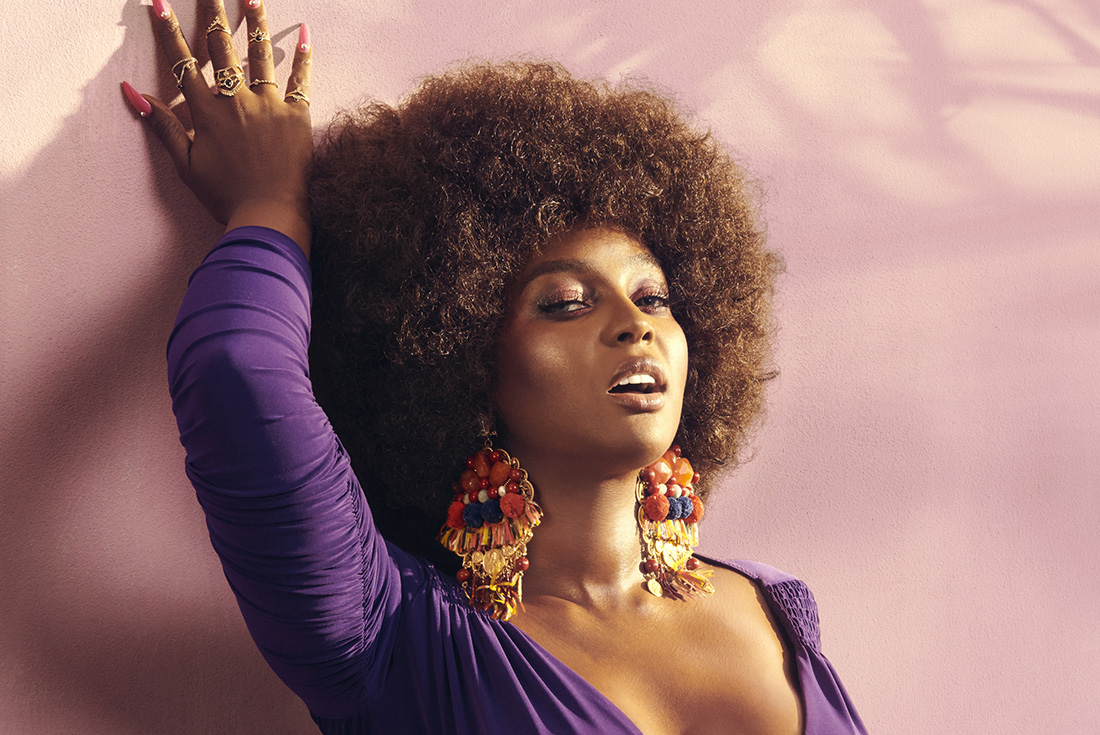
Recalling the incident on the show’s reunion special back in March, La Negra explained, “I was upset… but not really, because, unfortunately, all my life I’ve had to deal with people [who] have that mentality. There are certain people who will never understand.”
Almost a full year removed from the confrontation, the Dominican trailblazer remains focussed on how the hurdles she’s had to jump over the past year could clear an easier path for Black Latinas following in her footsteps.
“I think the day we feel accepted, more involved in our own stories, and given the same opportunities as people that benefit from appearing lighter, we’ll start to feel like change is being made in our favor,” she muses.
“When we see more people like myself on magazine covers and novelas and soap operas—which historically paints us as gangsters and prostitutes and slaves; when we’re seen as news reporters and executives and as the lead role, we’ll begin to see ourselves as we should. But we don’t see us outside of the streets and our barrios; we don’t see us in the mainstream, and it’s unfair. We need to desperately change that narrative. Not all of us are Jennifer Lopez, Sofia Vergara and Thalia.”
"At the end of the day, I’m not going to call myself something I’m not...I’m very proud of the skin I’m in, and of my people and culture.”
While La Negra has done valuable work, providing a voice for folks who resemble her appearance and share her origins, the past 12 months have been dominated by those who enjoy the privilege of experiencing neither. With a level of embrace unseen since the birth of reggaeton, a number of collaborations between hip-hop’s foremost contenders and Latin artists on the rise scored the latter half of 2018.
Non-Black Puerto Rican artists Bad Bunny and Anuel AA, for example, both earned favorable reception via respective duets with Drake and Meek Mill. While La Negra has become a fixture in the world of reality television, she’s yet to receive similar looks in the music industry.
The most ubiquitous artist of non-Black Latin descent this year was inarguably Mexican-American rapper Tekashi 6ix9ine. Not only has the now incarcerated Brooklyn native received cosigns from rap luminaries such as Nicki Minaj, Kanye West, and 50 Cent, but he’s stupefyingly loved and glorified by millions for his criminal transgressions, making a home for himself on the Billboard charts built with bricks laid in questionable fashion.
Continuing in the long-accepted tradition of White Latinos from Black neighborhoods granting themselves access to the N-word, the industry appears more welcoming of men like 6ix9ine infringing upon blackness than someone such as La Negra—a legitimate and unabashedly Black woman. Speaking to how 6ix9ine has been allowed to appropriate that which she embodies without consequence, the 28-year-old teeters between what feels right and wrong.
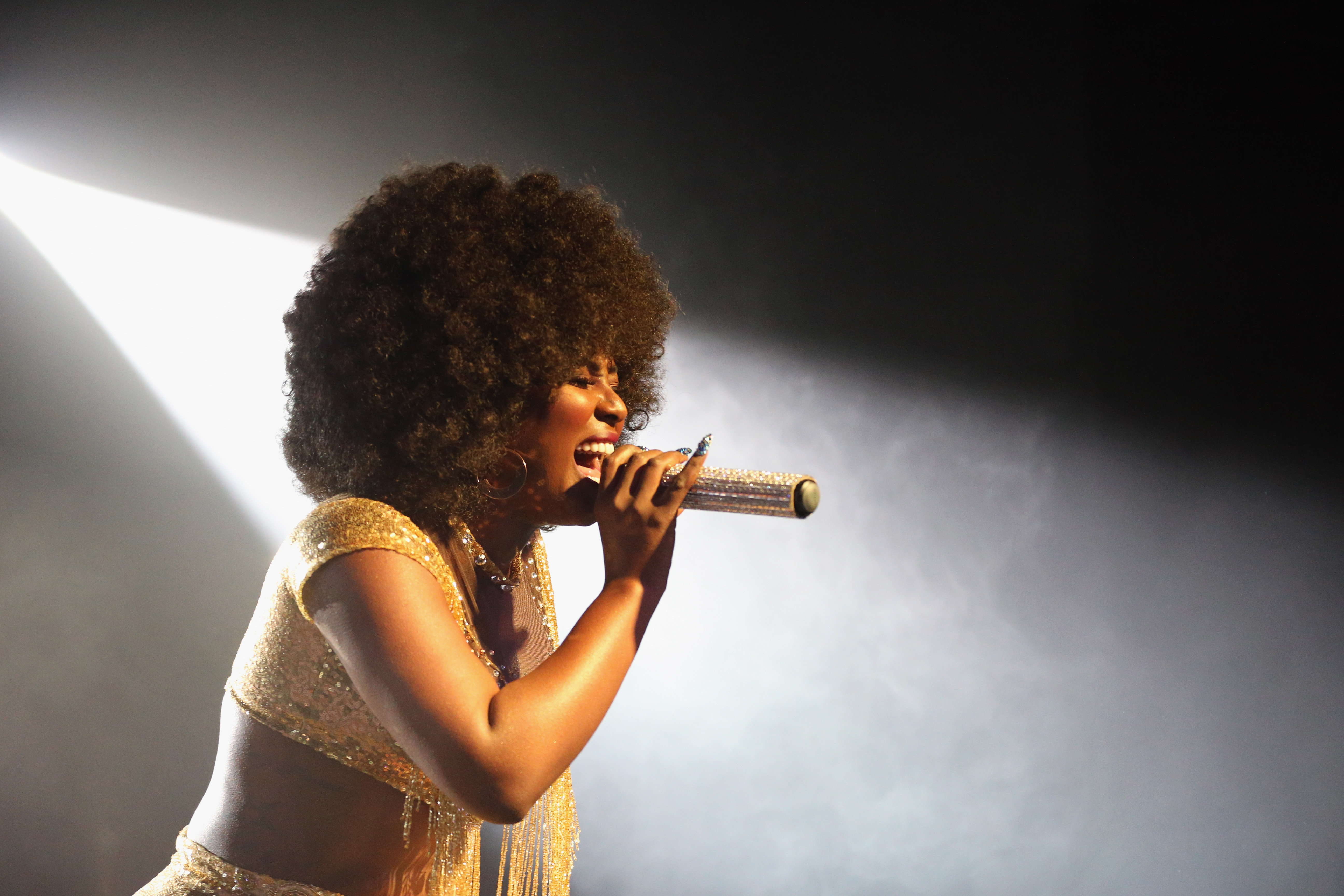
“To a certain extent I can see how it can be a matter of where [6ix9ine] feels inspired by a culture that maybe raised him,” she explains, choosing her words carefully. “I get how [he] may want to mimic that. However, [he] should know that a lot of people will take offense to the terminology [he uses].”
However alienated from the privileges of her male contemporaries, La Negra sees herself in a newfound friend and sister warrior: Jamaican dancehall artist and L&HH: Atlanta star Spice, who earlier this year surfaced images of herself with dramatically lighter skin. The eventual release of her latest audiovisual “Black Hypocrisy,” revealed Spice only pretended to bleach her skin to make a point about the lack of support dark skinned Black women receive in music and entertainment.
“Sometimes drastic moments require drastic measures,” La Negra explains, “and I love that she was willing to take the heat—willing to do something so different in order to make a point. No matter how much we have tried to talk about it, people just didn’t think to listen or take the time to understand. It took [Spice] making a video showing her with bleached skin in order for people to actually bother to pay attention and start a conversation. I support her 100 percent.”
Even as La Negra continues to break ground in America, her struggle persists as the African-American market has proven less enlightened on the nuances of blackness than one might expect. Even Cardi B, a light skinned Afro-Caribbean woman with roots in Trinidad and the Dominican Republic, has had her blackness questioned during feuds with Nicki Minaj and Azealia Banks this year. It’s as if being a product of immigrants or speaking Spanish (a colonizer’s tongue, just like English) strips Afro-Latina artists of their negritude in the narrow eyes of some—a challenging set of circumstances, despite continued good fortune.
Becoming the third artist in history to simultaneously place her first three songs on the Billboard Hot 100 chart in January, landing 14 spots at once on the Streaming Songs chart in April, and cementing her legacy as the first woman rapper with two Hot 100 No. 1 records in July, Cardi B made tremendous strides in establishing herself as a marketable star this year. Yet despite the rapper’s success in 2018, she still had to battle for respect in the Black community. While her artistry and personal story are quite different, La Negra will have to walk a similar tightrope in 2019 as she steps into the spotlight.
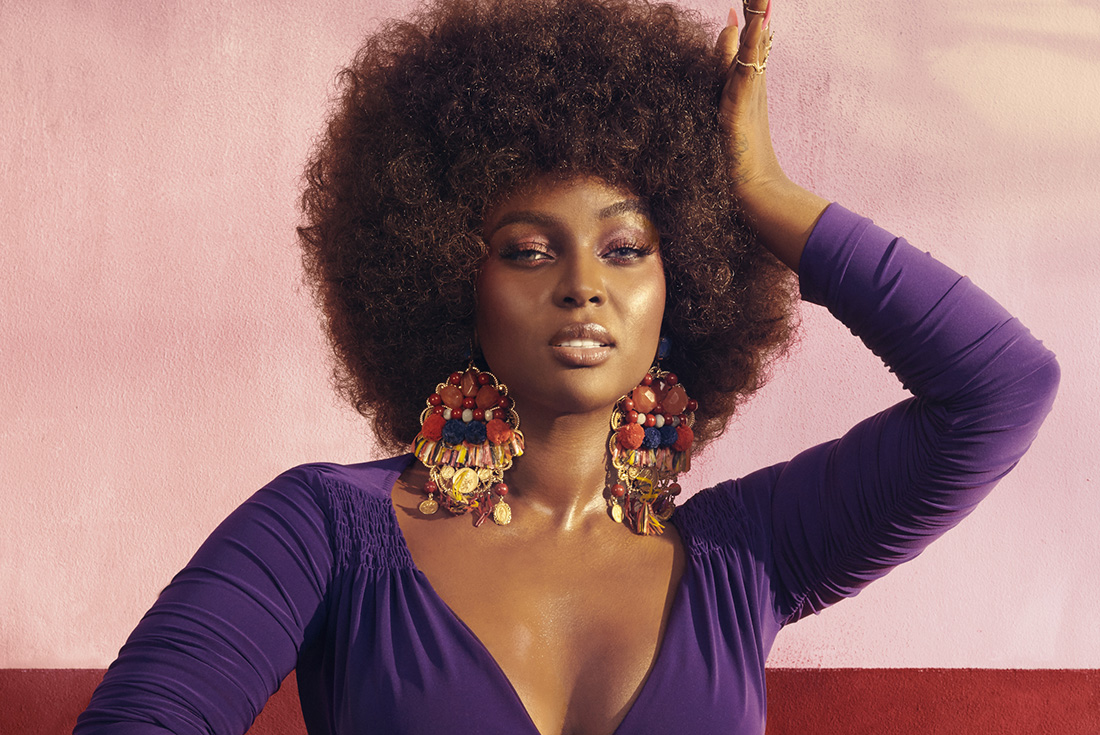
After signing a multimillion-dollar record deal and authoring her first children’s book this year, La Negra will begin the new year with a return to L&HH: Miami,10 days before her movie debut in the BET original film Fall Girls, premiering January 12. Her debut EP Unstoppable will release the same month, followed by a role on the Spanish-language version of Dancing With the Stars, Univision’s Mira Quien Baila. With a hustle true to her Caribbean upbringing, the Miami native secured yet another bag recently that’ll place her on billboards in Times Square, as part of a major campaign with Skyy Vodka.
A dark skinned starlet thriving in an ecosystem that typically celebrates mestiza and lighter skinned women, Amara La Negra lives on the hyphen. Not only the ones dictating her experience as an Afro-Latina, Dominican-American, and Black-Caribbean, but most importantly, the dashes conjoining her existence as an outcast-turned-advocate.
Fusing reggae, dembow, and favela funk in her music, and representing a region brimming with different Caribbean communities in South Florida, the singer herself offers a melting pot to sooth the pain of Black Latinas as they await a remedy for the racial woes that plague Latin communities. Moving between cultures, translating different languages, and negotiating relationships with separate homelands, Amara La Negra enters 2019 a bodacious queen, bountiful in both body and crown.
